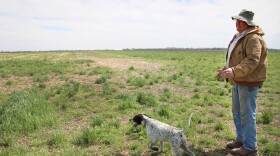
Eva Tesfaye
Journalist | New Orleans Public RadioEva Tesfaye was a Kansas City-based reporter covering agriculture, food and water issues for Harvest Public Media and the Mississippi River Basin Ag & Water Desk.
Tesfaye, who now works at WWNO in New Orleans, also previously worked at NPR’s daily science podcast Short Wave as a producer, where she reported and hosted episodes about horticulture and energy. Before that, Tesfaye spent a year as an NPR Kroc fellow during which she produced for the newsmagazine Weekend Edition, reported national stories for NPR, produced for a WFIU podcast and reported for the Gulf States Newsroom from WBHM in Birmingham, Alabama.
Tesfaye graduated from Columbia University with a B.A. in English. She's an Eritrean-American who grew up in South Africa before moving to the United States.
Follow her on X, formerly known as Twitter, at @EvaRTesfaye.
-
A new study from the U.S. Department of Agriculture found that the Special Supplemental Nutrition Program for Women, Infants and Children was underutilized. In 2021, it served only about half the number of those who qualified.
-
Thousands of competitors come to the American Royal Livestock Show in Kansas City, Missouri, each year to show their best livestock. The competition includes children as young as 7 years old, who take part in a long tradition of raising and showing their animals.
-
Food waste takes up space in landfills and produces methane, a powerful greenhouse gas that contributes to climate change. Composting that waste can reduce climate impacts and save municipalities money on landfill fees, but concerns about bad smells and pests sometimes get in the way.
-
A fifth of reported heat-related deaths between 2017 and 2022 were agricultural workers, according to OSHA data. Academics, occupational health specialists and advocacy groups are calling attention to the under-reported impact of climate change on this group from heatwaves.
-
A slowdown in the agricultural industry is "going to put a strain on farmers." But analysts say the rural economy in the Midwest and Great Plains is still doing well.
-
Congress expanded work requirements for food assistance during the debt ceiling negotiations, a move that would normally happen in the Farm Bill. Shortly before that, the state of Kansas made similar changes.
-
The United Nations has declared 2023 the International Year of Millets — a type of small grain mostly grown in parts of Asia and Africa. The highly resilient and cost-friendly grains could make them the next crop for U.S. farmers in the midst of climate change.
-
A new report from the Environmental Working Group found targeting the U.S. Department of Agriculture's conservation funding to the Mississippi River region would have huge benefits to water quality and the climate.
-
St. Louis’ water has been tested for toxic chemicals by the Missouri Department of Natural Resources over the past decade and found to be safe. But the new EPA rules would set higher safety standards, and St. Louis will be retested.
-
Legislation is being proposed at the federal and state level to restrict foreign ownership of farmland, especially by China. The scrutiny comes after a Midwestern project was scuttled by military concerns and the flight of a Chinese spy balloon across the U.S.
-
The Missouri Department of Conservation has started a new project to see how bald eagles in northwestern Missouri interact with wind turbines. Conservationists and wind energy advocates are both hoping that the results will advance both bird conservation and renewable energy goals.
-
Legislation and programs in Missouri and other Midwestern states are paving the way to welcome large livestock operations by limiting local control over the facilities. Some rural residents worry about the potential pollution and decreased quality of life that will bring.











